- Home
- Christopher Moore
Lamb: The Gospel According to Biff, Christ’s Childhood Pal Page 7
Lamb: The Gospel According to Biff, Christ’s Childhood Pal Read online
Page 7
“He can spare it,” Maggie said, and we both turned to her with our mouths hanging open. “Probably,” she added quickly. “I’m only guessing. What do I know, I’m just a girl. Do you guys smell something?”
We smelled the Roman before we heard him, heard him before we saw him. The Romans covered themselves with olive oil before they bathed, so if the wind was right or if it was an especially hot day you could smell a Roman coming at thirty paces. Between the olive oil they bathed with and the garlic and dried paste of anchovies they ate with their barley, when the legions marched into battle it must have smelled like an invasion of pizza people. If they’d had pizzas back then, which they didn’t.
Joshua took a quick swipe with the mallet and the chisel slipped, neatly severing Apollo’s unit, which fell to the dirt with a dull thud.
“Whoops,” said the Savior.
“Shhhhhhhh,” I shushed.
We heard the hobnails of the Roman’s boots scraping on stone. Joshua jumped down from the bucket and looked frantically for a place to hide. The walls of the Greek’s bathhouse were almost completed around the statue, so really, except for the entrance where the Roman was coming, there was no place to run.
“Hey, what are you doing there?”
We stood as still as the statue. I could see that it was the legionnaire that had been with Justus our first day in Sepphoris.
“Sir, it’s us, Biff and Joshua. Remember? The kid from the bread?”
The soldier moved closer, his hand on the haft of his half-drawn short sword. When he saw Joshua he relaxed a bit. “What are you doing here so early? No one is to be about at this hour.”
Suddenly, the soldier was yanked backward off of his feet and a dark figure fell on him, thrusting a blade into his chest over and over. Maggie screamed and the figure turned to us. I started to run.
“Stop,” the murderer hissed.
I froze. Maggie threw her arms around me and hid her face in my shirt as I trembled. A gurgling sound came from the soldier, but he lay still. Joshua made to step toward the murderer and I threw an arm across his chest to stop him.
“That was wrong,” Joshua said, almost in tears. “You are wrong to kill that man.”
The murderer held his bloody blade up by his face and grinned at us. “Is it not written that Moses became a prophet only after killing an Egyptian slave driver? No master but God!”
“Sicarii,” I said.
“Yes boy, Sicarii. Only when the Romans are dead will the Messiah come to set us free. I serve God by killing this tyrant.”
“You serve evil,” Joshua said. “The Messiah didn’t call for the blood of this Roman.”
The assassin raised his blade and came at Joshua. Maggie and I leapt back, but Joshua stood his ground. The assassin grabbed him by the front of his shirt and pulled him close. “What do you know of it, boy?”
We could clearly see the murderer’s face in the moonlight. Maggie gasped, “Jeremiah.”
His eyes went wide, with fear or recognition, I don’t know which. He released Joshua and made as if to grab Maggie. I pulled her away.
“Mary?” The anger had left his voice. “Little Mary?”
Maggie said nothing, but I could feel her shoulders heave as she began to sob.
“Tell no one of this,” the murderer said, now talking as if he were in a trance. He backed away and stood beside the dead soldier. “No master but God,” he said, then he turned and ran into the night.
Joshua put his hand on Maggie’s head and she immediately stopped crying.
“Jeremiah is my father’s brother,” she said.
Before I go on you should know about the Sicarii, and to know about them, you have to know about the Herods. So here you go.
About the time that Joshua and I were meeting for the first time, King Herod the Great died after ruling Israel (under the Romans) for over forty years. It was, in fact, the death of Herod that prompted Joseph to bring his family back to Nazareth from Egypt, but that’s another story. Now you need to know about Herod.
Herod wasn’t called “the Great” because he was a beloved ruler. Herod the Great, was, in fact, a fat, paranoid, pox-ridden tyrant who murdered thousands of Jews, including his own wife and many of his sons. Herod was called “the Great” because he built things. Amazing things: fortresses, palaces, theaters, harbors—a whole city, Caesarea, modeled on the Roman ideal of what a city should be. The one thing he did for the Jewish people, who hated him, was to rebuild the Temple of Solomon on Mount Moriah, the center of our faith. When H. the G. died, Rome divided his kingdom among three of his sons, Archelaus, Herod Philip, and Herod Antipas. It was Antipas who ultimately passed sentence on John the Baptist and gave Joshua over to Pilate. Antipas, you sniveling fuckstick (if only we’d had the word back then). It was Antipas whose toady pandering to the Romans caused bands of Jewish rebels to rise up in the hills by the hundreds. The Romans called all of these rebels Zealots, as if they were all united in method as well as cause, but, in fact, they were as fragmented as Jews of the villages. One of the bands that rose in Galilee called themselves the Sicarii. They showed their disapproval of Roman rule by the assassination of Roman soldiers and officials. Although certainly not the largest group of Zealots by number, they were the most conspicuous by their actions. No one knew where they came from, and no one knew where they went to after they killed, but every time they struck, the Romans did their best to make our lives hell to get us to give the killers up. And when the Romans caught a Zealot, they didn’t just crucify the leader of the band, they crucified the whole band, their families, and anyone suspected of helping them. More than once we saw the road out of Sepphoris lined with crosses and corpses. My people.
We ran through the sleeping city, stopping only after we had passed through the Venus Gate, where we fell in a heap on the ground, gasping.
“We have to take Maggie home and get back here for work,” Joshua said.
“You can stay here,” Maggie said. “I can go by myself.”
“No, we have to go.” Joshua held his arms out to his sides and we saw the bloody handprints the killer had left on his shirt. “I have to clean this before someone sees it.”
“Can’t you just make it go away?” Maggie asked. “It’s just a stain. I’d think the Messiah could get a stain out.”
“Be nice,” I said. “He’s not that good at Messiah stuff yet. It was your uncle, after all…”
Maggie jumped to her feet. “You were the one who wanted to do this stupid thing…”
“Stop!” Joshua said, holding his hand up as if he were sprinkling us with silence. “If Maggie hadn’t been with us, we might be dead now. We may still not be safe when the Sicarii realize that three witnesses live.”
An hour later Maggie was home safe and Joshua emerged from the ritual bath outside the synagogue, his clothes soaked and rivulets running out of his hair. (Many of us had these mikvehs outside of our homes—and there were hundreds outside the Temple in Jerusalem—stone pits with steps leading down both sides into the water so one might walk in over one’s head on one side, then out on the other after the ritual cleansing was done. According to the Law, any contact with blood called for a cleansing. Joshua thought it would be a good opportunity to scrub the stain out of his shirt as well.)
“Cold.” Joshua was shivering and hopping from foot to foot as if on hot coals. “Very cold.”
(There was a small stone hut built over the baths so they never got the direct light of the sun, consequently they never warmed up. Evaporation in the dry Galilee air chilled the water even more.)
“Maybe you should come to my house. My mother will have a breakfast fire going by now, you can warm yourself.”
He wrung out the tail of his shirt and water cascaded down his legs. “And how would I explain this?”
“Uh, you sinned, had an emergency cleansing to do.”
“Sinned? At dawn? What sin could I have done before dawn?”
“Sin of Onan?” I said.
Joshua’s eyes went wide. “Have you committed the sin of Onan?”
“No, but I’m looking forward to it.”
“I can’t tell your mother that I’ve committed the sin of Onan. I haven’t.”
“You could if you’re fast.”
“I’ll suffer the cold,” Joshua said.
The good old sin of Onan. That brings back memories.
The sin of Onan. Spilling the old seed on the ground. Cuffing the camel. Dusting the donkey. Flogging the Pharisee. Onanism, a sin that requires hundreds of hours of practice to get right, or at least that’s what I told myself. God slew Onan for spilling his seed on the ground (Onan’s seed, not God’s. God’s seed turned out to be my best pal. Imagine the trouble you’d be in if you actually spilled God’s seed. Try explaining that). According to the Law, if you had any contact with “nocturnal emissions” (which are not what come out of your tailpipe at night—we didn’t have cars then), you had to purify yourself by baptism and you weren’t allowed to be around people until the next day. Around the age of thirteen I spent a lot of time in and out of our mikveh, but I fudged on the solitary part of penance. I mean, it’s not like that was going to help the problem.
Many a morning I was still dripping and shivering from the bath when I met Joshua to go to work.
“Spilled your seed upon the ground again?” he’d ask.
“Yep.”
“You’re unclean, you know?”
“Yeah, I’m getting all wrinkly from purifying myself.”
“You could stop.”
“I tried. I think I’m being vexed by a demon.”
“I could try to heal you.”
“No way, Josh, I’m having enough trouble with laying on of my own hands.”
“You don’t want me to cast out your demon?”
“I thought I’d try to exhaust him first.”
“I could tell the scribes and they would have you stoned.” (Always trying to be helpful, Josh was.)
“That would probably work, but it is written that ‘when the oil of the lamp is used up, the wanker shall light his own way to salvation.’”
“That is not written.”
“It is too. In, uh, Isaiah.”
“Is not.”
“You need to study your Prophets, Josh. How are you going to be the Messiah if you don’t know your Prophets?”
Joshua hung his head. “You are right, of course.”
I clapped him on the shoulder. “You’ll have time to learn the Prophets. Let’s cut through the square and see if there are any girls gathering water.”
Of course it was Maggie I was looking for. It was always Maggie.
By the time we got back to Sepphoris the sun was well up, but the stream of merchants and farmers that normally poured through the Venus Gate was not there. Roman soldiers were stopping and searching everyone who was trying to leave the city, sending them back the way they came. A group of men and women were waiting outside the gate to go in, my father and some of his helpers among them.
“Levi!” my father called. He ran to us and herded us to the side of the road.
“What’s going on?” I asked, trying to look innocent.
“A Roman soldier was murdered last night. There will be no work today, now you both go home and stay there. Tell your mothers to keep the children in today. If the Romans don’t find the killer there’ll be soldiers in Nazareth before noon.”
“Where is Joseph?” Joshua asked.
My father put his arm around Joshua’s shoulder. “He’s been arrested. He must have come to work very early. They found him at first light, near the body of the dead soldier. I only know what has been shouted from inside the gate, the Romans aren’t letting anyone in or out of the city. Joshua, tell your mother not to worry. Joseph is a good man, the Lord will protect him. Besides, if the Romans thought he was the killer he would have been tried already.”
Joshua backed away from my father in stiff, stumbling steps. He stared straight ahead, but obviously saw nothing.
“Take him home, Biff. I’ll be along as soon as I can. I’m going to try to find out what they’ve done with Joseph.”
I nodded and led Joshua away by the shoulders.
When we were a few steps down the road, he said, “Joseph came looking for me. He was working on the other side of the city. The only reason he was near the Greek’s house is that he was looking for me.”
“We’ll tell the centurion we saw who killed the soldier. He’ll believe us.”
“And if he believes us, believes it was Sicarii, what will happen to Maggie and her family?”
I didn’t know what to say. Joshua was right and my father was wrong, Joseph was not fine. The Romans would be questioning him right now, maybe torturing him to find out who his accomplices were. That he didn’t know anything would not save him. And a testimony from his son not only wouldn’t save him, but would send more people to the cross to join him. Jewish blood was going to be spilled one way or the other over this.
Joshua shook off my hands and ran off the road into an olive grove. I started to follow, but he suddenly spun on me and the fury of his gaze stopped me in midstride.
“Wait,” he said. “I need to talk to my father.”
I waited by the road for nearly an hour. When Joshua walked out of the olive grove he looked as if a shadow had fallen permanently on his face.
“I am lost,” he said.
I pointed over my shoulder. “Nazareth that way, Sepphoris the other way. You’re in the middle. Feel better?”
“You know what I mean.”
“No help from your father, then?” I always felt strange asking about Joshua’s prayers. You had to see him pray, especially in those days, before we had traveled. There was a lot of strain and trembling, like someone trying to force a fever to break by sheer will. There was no peace in it.
“I am alone,” Joshua said.
I punched him in the arm, hard. “Then you didn’t feel that.”
“Ouch. What’d you do that for?”
“Sorry, no one around to answer you. You’re soooooooo alone.”
“I am alone!”
I wound up for a full-body-powered roundhouse punch. “Then you won’t mind if I smite the bejeezus out of you.”
He threw up his hands and jumped back. “No, don’t.”
“So you’re not alone?”
“I guess not.”
“Good, then wait here. I’m going to go talk to your father myself.” I tramped off into the olive grove.
“You don’t have to go in there to talk to him. He is everywhere.”
“Yeah, right, like you know. If he’s everywhere then how are you alone?”
“Good point.”
I left Joshua standing by the road and went off to pray.
And thus did I pray:
“Heavenly Father, God of my father and my father’s father, God of Abraham and Isaac, God of Moses, who did lead our people out of Egypt, God of David and Solomon—well, you know who you are. Heavenly Father, far be it from me to question your judgment, being as you are all powerful and the God of Moses and all of the above, but what exactly are you trying to do to this poor kid? I mean, he’s your son, right? He’s the Messiah, right? Are you pulling one of those Abraham faith-test things on him? In case you didn’t notice, he’s in quite a pickle here, having witnessed a murder and his stepfather under arrest by the Romans, and in all likelihood, a lot of our people, who you have mentioned on more than one occasion are your favorites and the chosen (and of which I am one, by the way) are going to be tortured and killed unless we—I mean he—does something. So, what I’m saying here is, could you, much as you did with Samson when he was backed into a corner weaponless against the Philistines, throw the kid a bone here?
“With all due respect. Your friend, Biff. Amen.”
I was never very good at prayer. Storytelling, I’m fine with. I, in fact, am the originator of a universal story that I know has survived to this time because I have hear
d it on TV.
It begins: “Two Jews go into a bar…”
Those two Jews? Me and Josh. No kidding.
Anyway, I’m not good at prayer, but before you think I was a little rough on God, there’s another thing you need to know about my people. Our relationship with God was different from other people and their Gods. Sure there was fear and sacrifice and all, but essentially, we didn’t go to him, he came to us. He told us we were the chosen, he told us he would help us to multiply to the ends of the earth, he told us he would give us a land of milk and honey. We didn’t go to him. We didn’t ask. And since he came to us, we figure we can hold him responsible for what he does and what happens to us. For it is written that “he who can walk away, controls the deal.” And if there’s anything you learn from reading the Bible, it’s that my people walked away a lot. You couldn’t turn around that we weren’t off in Babylon worshiping false gods, building false altars, or sleeping with unsuitable women. (Although the latter may be more of a guy thing than a Jewish thing.) And God pretty much didn’t mind throwing us into slavery or simply massacring us when we did that. We have that kind of relationship with God. We’re family.
So I’m not a prayer-master, so to speak, but that particular prayer couldn’t have been that bad, because God answered. Well, he left me a message, anyway.
As I emerged from the olive grove, Joshua held out his hand and said, “God left a message.”
“It’s a lizard,” I said. It was. Joshua was holding a small lizard in his outstretched hand.
“Yes, that’s the message, don’t you see?”
How was I to know what was going on? Joshua had never lied to me, never. So if he said that this lizard was a message from God, who was I to dispute him? I fell to my knees and bowed my head under Josh’s outstretched hand. “Lord have mercy on me, I was expecting a burning bush or something. Sorry. Really.” Then to Josh, I said, “I’m not so sure you should take that seriously, Josh. Reptiles don’t tend to have a great record for getting the message right. Like for instance, oh, let’s see, that Adam and Eve thing.”

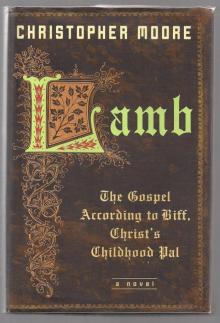 Lamb: The Gospel According to Biff, Christs Childhood Pal
Lamb: The Gospel According to Biff, Christs Childhood Pal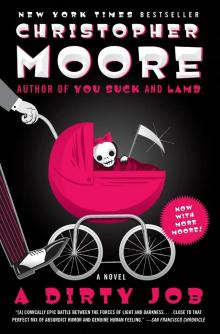 A Dirty Job
A Dirty Job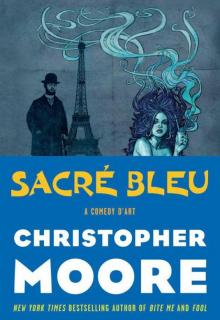 Sacré Bleu
Sacré Bleu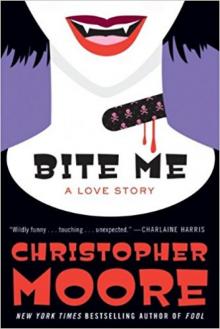 Bite Me: A Love Story
Bite Me: A Love Story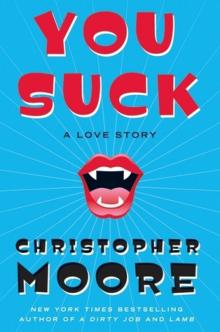 You Suck: A Love Story
You Suck: A Love Story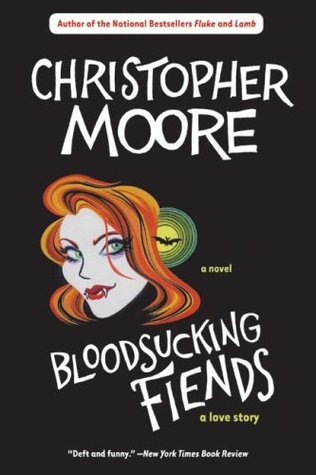 Bloodsucking Fiends: A Love Story
Bloodsucking Fiends: A Love Story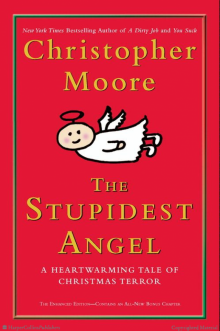 The Stupidest Angel
The Stupidest Angel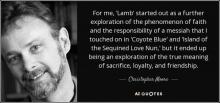 Coyote Blue
Coyote Blue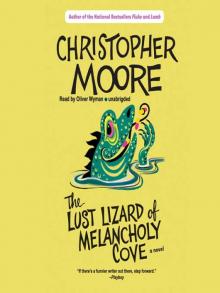 The Lust Lizard of Melancholy Cove
The Lust Lizard of Melancholy Cove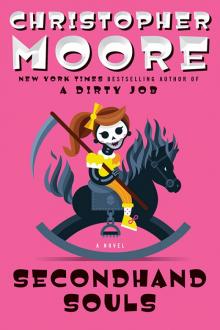 Secondhand Souls
Secondhand Souls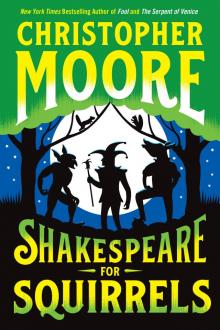 Shakespeare for Squirrels
Shakespeare for Squirrels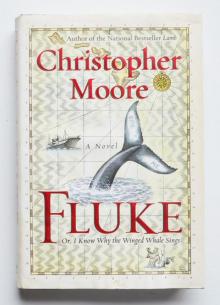 Fluke, or, I Know Why the Winged Whale Sings
Fluke, or, I Know Why the Winged Whale Sings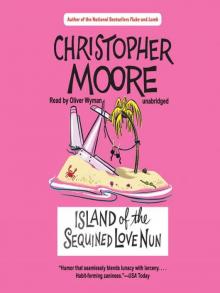 Island of the Sequined Love Nun
Island of the Sequined Love Nun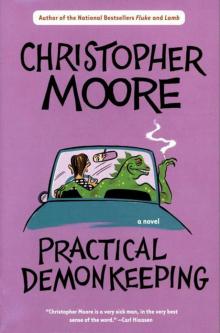 Practical Demonkeeping
Practical Demonkeeping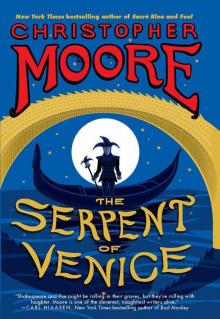 The Serpent of Venice
The Serpent of Venice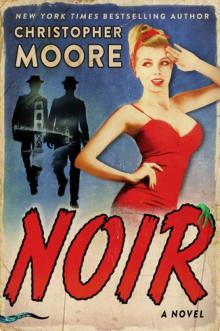 Noir
Noir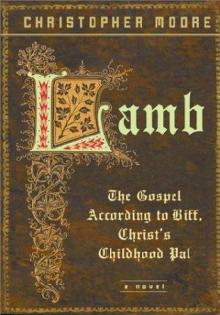 Lamb: The Gospel According to Biff, Christ’s Childhood Pal
Lamb: The Gospel According to Biff, Christ’s Childhood Pal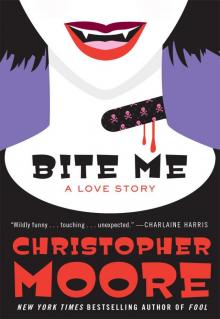 Bite Me
Bite Me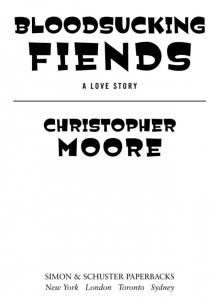 Bloodsucking Fiends
Bloodsucking Fiends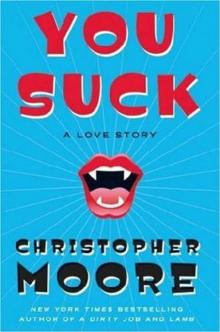 You Suck ls-2
You Suck ls-2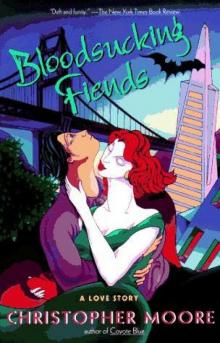 Bloodsucking Fiends ls-1
Bloodsucking Fiends ls-1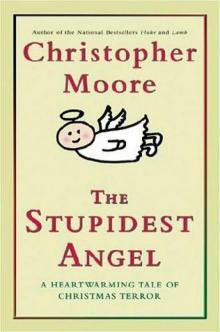 The Stupidest Angel: A Heartwarming Tale of Christmas Terror
The Stupidest Angel: A Heartwarming Tale of Christmas Terror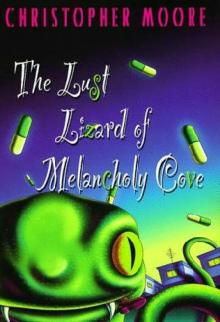 The Lust Lizard of Melancholy Cove pc-2
The Lust Lizard of Melancholy Cove pc-2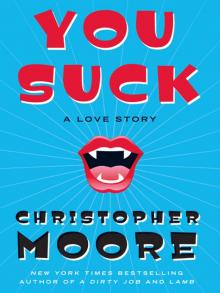 You Suck
You Suck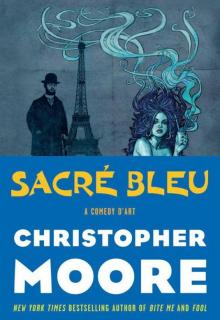 Sacre Bleu: A Comedy d'Art
Sacre Bleu: A Comedy d'Art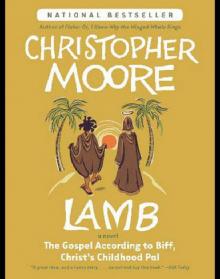 Lamb
Lamb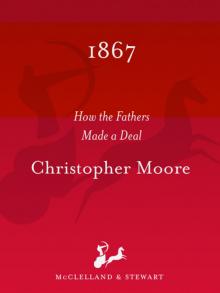 1867
1867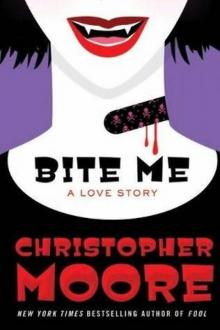 Bite Me ls-3
Bite Me ls-3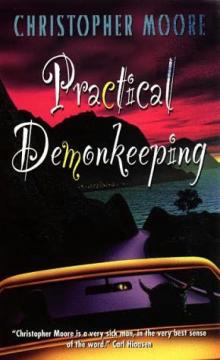 Practical Demonkeeping pc-1
Practical Demonkeeping pc-1